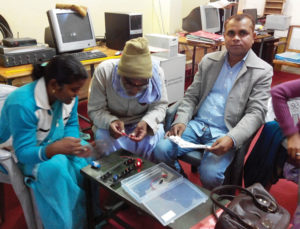Pearson Affordable Education Fund backed-Experifun, which supplies STEM-based learning kits to schools, plans to reach 3000 schools in the next 5 years

When Rakesh Kumar went to meet his IIM professor with a friend of his, he was flummoxed that he didn’t know something which any engineering graduate ought to know. After this conversation, Kumar realised his problem, which was his inability to visualise the concept on which his professor had questioned him. Kumar, an IIT BHU and IIM A graduate, says that not being able to answer the question compelled him to focus on how education is delivered and, thus, Experifun was born.
The Bengaluru-based company provides STEM (science, technology, engineering and mathematics) -based learning kits at affordable prices and has reached over 575 schools in 16 states. “Our products have been used by around 2.15 lakh students,” claims the founder. The company’s products include a science innovation lab, maths worksheets, computer DIY kits and robotics kits which come with experiments and assessment sheets.
The team’s main aim was to price the products affordable in order to reach Government and urban schools. To keep the costs low, the team had to find a balance between making the product visually appealing and keeping the packaging simple. “We also made sure that we cut down on the size of the product,” says he. For example, they made the product 7 centimetres instead of 10 centimetres to reduce material costs without compromising on the quality of user experience.
Since they work with schools only, they rely solely on the B2B channel. “Selling to schools is very tough as getting time with the management is a challenge,” says Kumar. And hence, they courier their product to schools and then do Skype calls with the management to explain the product. “This has worked well for us,” he says, “because once schools receive the physical product they contact us as they are curious.” This also reduces the sales force on the ground.
To keep the costs low, the team had to find a balance between making the product visually appealing and keeping the packaging simple.
Business Model
Experifun products come in seven languages. Apart from English, the team made a decision to cater to the specific requirements of boards in different languages which include Marathi, Hindi, Kannada, Odia, Telugu and Tamil. This aligns with their orientation towards catering to schools, which are not well-funded.
While being bootstrapped, the company had approached various angel investors when then they were developing different products. But the journey with Pearson started when they were just in 15 to 20 schools with 2 to 3 products. “Once we were able to showcase the validity of the product, Pearson came on Board. For them, the number of paid customers and the potential of the product lines to split into different segments and pipelines, sealed the deal,” he says.
The path ahead
While they were initially excited about taking Experifun products to schools along with the Pearson textbooks, soon, they were met with roadblocks. “There are many regulatory constraints in terms of combining our products with textbooks,” Kumar notes on the restrictions to marketing kits along with textbooks.
In the coming 5 years, the company hopes to have a presence in 3000 to 5000 schools. They are also working towards increasing their conversion rate, which is around 25 percent currently, and are aiming to become profitable this year.
Snapshot – Experifun
Founder: Rakesh Kumar
Year: 2012
Headquarters: Bengaluru
Employees: 32
Profile
The Bengaluru-based company provides STEM-based learning kits at affordable prices and has reached over 575 schools in 16 states. “Our products have been used by around 2.15 lakh students,” claims the founder. The company’s products include a science innovation lab, maths worksheets, computer DIY kits and robotics kits which come with experiments and assessment sheets